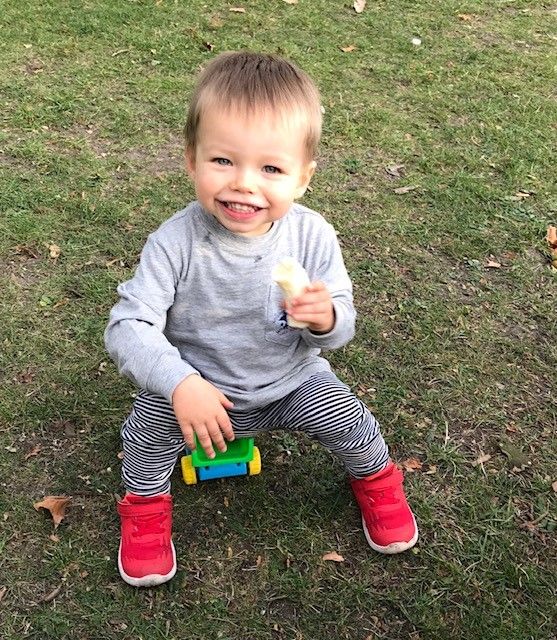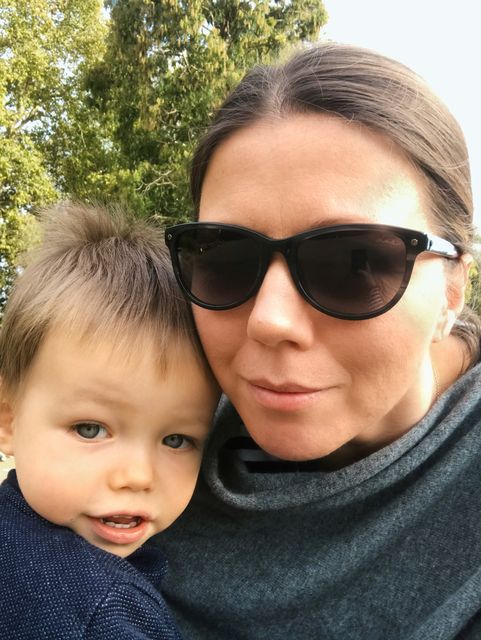Children with aggressive blood cancer could benefit from a new treatment being launched at Great Ormond Street, which experts hope will cure the disease.
Youngsters with T-cell acute lymphoblastic leukaemia (T-ALL) will be offered CAR T-cell therapy targeted at a specific protein, which has been newly identified by researchers as occurring only on cancerous white blood cells.
CAR T-cell therapy involves genetically modifying the body’s immune cells to recognise and kill cancer cells and has already shown success in other cancers, but not in T-ALL.
But experts now believe they have a much clearer target for attacking this type of deadly cancer owing to the fact they have identified the protein CCR9 on cancerous T cells (an important type of white blood cell).
Frank Hanson died aged two from T-ALL leukaemia (Maris Hanson/PA)
As part of a new study into the treatment, Dr Sara Ghorashian, a consultant haematologist at Great Ormond Street Hospital (GOSH), and her team from GOSH and the University College London Great Ormond Street Institute of Child Health, are recruiting 12 children.
All have T-ALL that relapses or is resistant to conventional treatments, such as chemotherapy and bone marrow transplant.
The study will open from around April next year at both GOSH and University College London Hospital (UCLH), with the CAR T-cell therapy, which is given as an infusion, created at UCL.
The Great Ormond Street Hospital Charity has given £2.4 million to support the study.
Furthermore, in a step change, the research will also test a novel approach to clinical trials by running a child and adult study at the same time.
According to GOSH, dedicated research projects for children’s cancers are rare, with paediatric clinical trials traditionally starting much later than for adults and taking an average of 6.5 years longer to complete.
The new method could save time and money, and would help ensure children and adults had access to targeted therapies on the NHS at the same time, rather than children being forced to wait.
Researchers believe the therapy could work – it has been shown to clear leukaemia in the lab and in animal studies – and it is known that children tend to tolerate CAR T-cell therapy better than adults.
Although cancer is the biggest killer of children aged 14 and under in the UK, only 12 anti-cancer medicines have been authorised for paediatric cancer specifically in the last decade, compared to more than 150 for adult cancers, according to GOSH.
Dr Ghorashian told the PA news agency there was a “perception that there shouldn’t be early-phase clinical studies in paediatrics” but that this created problems for children in accessing new drugs and therapies.
She added: “Often things like the specifics of how a drug is delivered are just borrowed from adults and not necessarily tailored to children.
“We don’t have as many new drugs for cancer in childhood cancers as we do for adult cancers, and the drugs come later to children.
Frank Hanson with his mother Maris, who is raising funds and awareness for GOSH Charity (Family Handout/PA)
“They come with dosing that’s borrowed from adults, and what we should be doing is testing them in parallel – making sure they’re safe in the first instance – but not preventing access to effective treatments for children.”
Dr Ghorashian said no CAR T-cell remedies had been effective for T-ALL to date. But it had shown success in another type of leukaemia called B cell acute lymphoblastic leukaemia.
She said: “Our target, the CCR9 target, is only present on a very, very small proportion – around one to 2% of T cells in total – which means that when we treat with CAR T-cell therapy, hopefully, we won’t be eliminating healthy T cells in any significant numbers.
“This means that the patient’s leukemia will be eliminated if we’re lucky, but the patient’s healthy T cells will remain and will be able to continue fighting infection.”
Following treatment, the patients in the study would not need a bone marrow transplant to replace healthy T cells that had been killed off by CAR T.
“If we can deliver a CAR T-cell therapy that doesn’t have to be consolidated with a rescue transplant, that is beneficial,” Dr Ghorashian said.
“That’s why we’re particularly excited to test this and see if it’s going to be effective.”
While CAR T-cell therapy can cause side effects, these are usually manageable compared to the long-term effects of chemotherapy and bone marrow transplant.
Dr Ghorashian hopes the trial will help establish a precedent for future child-adult studies, adding: “Too often, children wait unacceptable amounts of time to access new cancer treatment which could make all the difference.
“This study will pave the way for research to always include children, and make it a matter of course that both paediatric and adult patients are incorporated within clinical trials at the same time.
“Our goal is to never have a situation where children are left behind and we hope that we can prove the benefit of this novel approach to influence a change in the law in the future.”
Maris Hanson, 47, lost her son Frank to T-ALL in 2019, shortly after his second birthday.
Mrs Hanson, who is group chief legal and people officer at Giant Group, is now raising funds and awareness for GOSH Charity.
She told PA: “Frank was an incredibly happy child, very inquisitive and always looking out for new experiences. He was very active as a boy, he always wanted to be out and about.”
Frank fell ill ahead of his second birthday in January 2019 when his parents noticed a lingering type of infection with low-grade temperature.
He recovered but then became very ill on a flight to Estonia and was flown back to the UK by medical plane for treatment at GOSH.
Mrs Hanson said: “When Frank was diagnosed, I felt like my legs were taken out from under me.
“Even when the leukaemia spread to his brain, we still had hope. We hoped there would be a miracle; something would click and Frank would get better.
“But there comes a point when you can no longer treat the child if it means they’ll have no quality of life …
“After three-and-a-half months, it was on the Mother’s Day weekend, we were basically told ‘there isn’t anything else that we can do, because … his form of leukemia doesn’t respond’.
“So within four months, this journey basically ended for us in a way that I would never want any other parent to go through and let alone the child themselves, because it’s cruel.”
Mrs Hanson, who lives in west London, said she was determined to raise awareness of clinical trials for children.
“I was in a situation that I’ve lost my son,” she said. “And I thought what can I do that would still, in a way, benefit him as well? That’s one way of me being able to continue to live my life.”
GOSH Charity is running its biggest ever fundraising appeal to build a new Children’s Cancer Centre on site.
Dr Aoife Regan, GOSH Charity’s director of impact and charitable funding, said: “In line with our new cancer research strategy, we are really proud to be funding this important study which will hopefully, not only provide a potential new treatment option for children with a particularly aggressive form of cancer, but also lay the foundations for a new, more efficient clinical trial design that would benefit even more seriously ill children in the future.”

